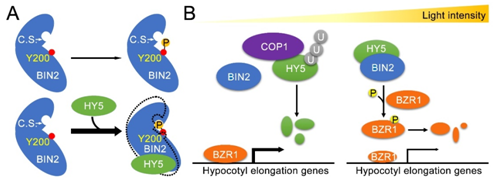SUSTech researchers find unique function for light-based growth-promoting protein
2020-04-10
Light is not only the ultimate source of energy but is also one of the most critical environmental signals for plants. Plants must balance their need to grow with their need to survive through a variety of regulatory mechanisms, and research led by SUSTech scholars could indicate the role of a specific protein, called HY5 (Elongated Hypocotyls-5).
On March 27, Chair Professor Xingwang Deng (Biology) led his research group to publish a paper in the high-impact academic journal, Nature Communications (IF = 11.801). The article, entitled “Modulation of BIN2 kinase activity by HY5 controls hypocotyl elongation in the light,” shows how HY5 can promote the growth of plants through protein-protein interaction.

Fig. 1 HY5-mediated regulation of BIN2 kinase activity inhibits hypocotyl elongation of seedlings in the light
Brassinosteroid (BR) can promote cell elongation with GSK3β-like kinase BIN2 mediating the phosphorylation and degradation of transcription factor BZR1, thereby inhibit hypocotyl elongation. Previous studies had reported a decline of BZR1 abundance in HY5 overexpressing lines. However, the mechanism that makes this happen remains unknown.
The researchers in this study found that HY5 can enhance BIN2 kinase activity to promote BIN2-mediated phosphorylation and degradation of BZR1. When the light intensity increases, an increasing amount of HY5 protein could bind BIN2 to enhance its activity further. The enhanced activity subtly adjusts hypocotyl growth.
The researchers cooperated with Associate Professor Xinqi Gong of Renmin University of China (RUC), to simulate the structure of the HY5–BIN2 complex. Their results showed that the direction of BIN2 motion changes from twist to open-close under HY5. It results in an intramolecular approach of active catalytic sites of BIN2 to its Y200 residue. This sees an increase in autophosphorylation of BIN2 Y200.
Together, this paper reveals a novel way that HY5 inhibits hypocotyl elongation, suggests a mechanism underlying the promotion of GSK3β kinase activity and repression of BR signaling.
The first author is SUSTech Research Assistant Professor Jian Li. SUSTech and PKU Professor Xingwang Deng, PKU associate research scientist Danmeng Zhu and RUC associate professor Xinqi Gong were the co-corresponding authors.
The research received financial support from SUSTech, the National Key R&D Program of China, the National Natural Science Foundation of China, the State Key Laboratory of Protein and Plant Gene Research, and the Peking-Tsinghua Center for Life Sciences.
Article link: https://www.nature.com/articles/s41467-020-15394-7




